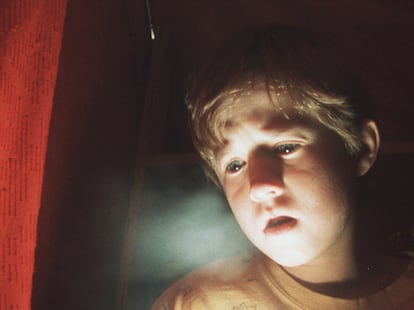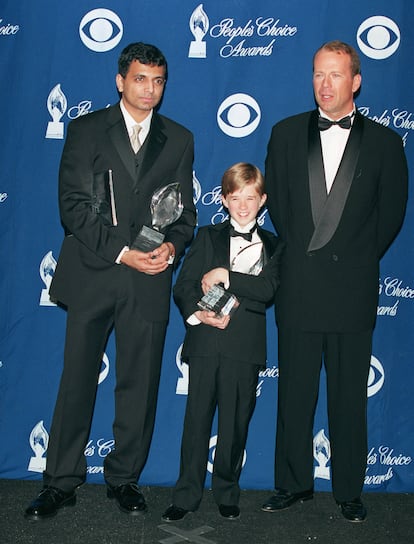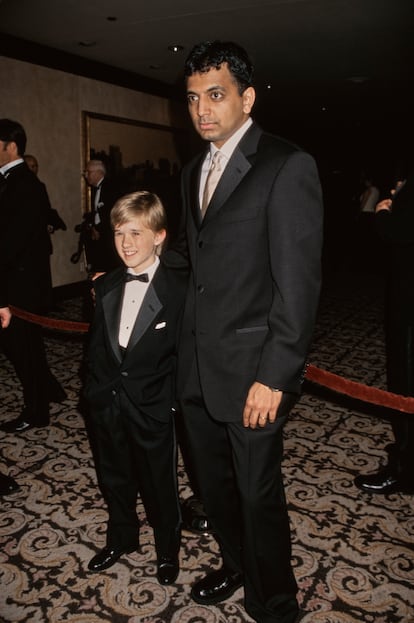Why ‘The Sixth Sense’ was the best and worst thing that could have happened to Shyamalan: ‘Such a powerful final twist left a mark on him’
Nominated for an Oscar for Best Picture, the filmmaker’s debut in horror was a cultural phenomenon and the second-biggest hit of 1999 after ‘Star Wars’. Its surprise ending, however, cast a shadow over his next projects

Few financial disasters have been as profitable for Disney as the unfinished Broadway Brawler (1997), a hockey-themed romantic comedy that imploded after 20 days, after burning through $17 million. Its star and producer, Bruce Willis, decided that no one was doing their job properly and fired half the crew, including the director. According to some sources, his faith in the project was definitively shaken when Bunny Parker — his longtime trusted hairstylist — left the movie to work on The Horse Whisperer (1998). Filming never resumed, and Disney threatened to take the star to court. They finally agreed that Willis would act in three films at a reduced fee to compensate the studio. The movies were Armageddon (1998), The Sixth Sense (1999) and The Kid (2000), which together grossed more than $1.3 billion.
The Sixth Sense was the most daring bet. David Vogel, president of Walt Disney Studios, liked the script so much that he even agreed to writer M. Night Shyamalan’s condition: that he be allowed to direct the movie, despite being a twenty-something whose greatest feat in Hollywood was having rewritten Stuart Little (1998). When Vogel was fired, Disney passed the ball to another company, Spyglass Entertainment, and was left with only the distribution rights and a percentage of the box office. Against all odds, The Sixth Sense turned out to be the second highest-grossing film of its year, behind only Star Wars: The Phantom Menace. It became a cultural phenomenon and ended up receiving six Oscar nominations, including one for Best Director for the (almost) first-timer Shyamalan and Best Picture. Not since The Silence of the Lambs (1991) had a horror movie been nominated for the top Oscar.
Released in the U.S. on August 6, 1999, Shyamalan’s 28th birthday, The Sixth Sense played a key role in the transformation of horror films, paving the way for what the genre would be like in the 21st century. If another of that year’s hits, The Blair Witch Project, started the trend of fake found footage, Shyamalan’s film encouraged a change of pace from the teen horror of the 1990s, with its psychological approach, dramatic context and, above all, surprises.

Because, like classics such as Psycho (1960), Planet of the Apes (1968) and The Empire Strikes Back (1980), The Sixth Sense is a film that is just as famous for its story as it is for its plot twist. The movie is about a boy (Haley Joel Osment) who sees dead people and a child psychologist (Willis) who helps him overcome his fear. But it has a surprise ending: the psychologist was dead from the beginning. This twist shocked audiences and sealed the director’s fate. Shyamalan had a guaranteed career in Hollywood, but also expectations to meet. After all, he was “The Sixth Sense guy.”
Fear of spoilers
“The Sixth Sense was the movie that didn’t have the legacy to deal with. It didn’t have my name to deal with,” M. Night Shyamalan told Variety in 2019, in an interview to mark the 20th anniversary of the movie. “That movie created a relationship with my name, and then the name itself now has a framing for all the rest of its cousins.”
Filmmaker Raúl Cerezo, co-director of the Spanish horror film Old Men (2022) and co-author of the book M. Night Shyamalan: The Crystal Filmmaker, agrees that the ending of The Sixth Sense took a took on Shyamalan. “Creating such a powerful final plot twist has left its mark on him. The twist in The Sixth Sense is unbeatable, not only because of the surprise, but because of how well it fits with what he wants to say in the film. Bruce Willis helps the kid find his way and the kid helps him find his way,” Cerezo tells EL PAÍS. “Shyamalan has continued to make brilliant movies, but a lot of people complain that they don’t have a twist like The Sixth Sense, when he has better movies that don’t have a twist.”
Cerezo gives the example of Signs (2002), which, despite its box-office success, was hostilely received by critics and audiences: it did not have a big final surprise — at least, not one that redefined the terms of the main plot. The same was true of Lady in the Water (2006) or The Happening (2008). For the writer-director, the strength of Shyamalan’s scripts is not necessarily their “elaborate surprise endings,” which he links to Shyamalan’s interest in Rod Serling and his television series The Twilight Zone (1959), but rather their thematic depth: “In The Sixth Sense, he talks about identity, about overcoming trauma, just as in The Village [2004] he talks about love, in Signs about faith or in The Happening, about community. People who don’t watch horror films because they’re scared of them or mistakenly believe that they’re a lesser genre come to Shyamalan for his dramatic stories and his characters. He also always has stars in the cast. He has the ability to win everyone over.”
In a 2005 USA Today article titled This Shocking Twist Is… Secret, journalist Anthony Breznican described how the success of The Sixth Sense had studios to advertise the fact that a movie had a surprise plot twist. The trailer for The Skeleton Key (2005) featured a voice-over proclaiming that the film had “an ending like The Others [2001], Rosemary’s Baby [1968], and The Sixth Sense.”
Ehren Kruger, the screenwriter of The Skeleton Key, that giving advance notice of a twist spoiled the experience of the movie. He argued that interested of being interested in the story, viewers would just be guessing how it would end. He also warned about the rise of “spoiler culture” on the internet. For example, the ending of The Village was leaked online, which dissuaded many from seeing the film, as if no other element of the movie was worth watching.

“Add some twists”
In the most famous scene in The Sixth Sense, when the boy tells Bruce Willis, “I see dead people,” Haley Joel Osment’s character also chides the child psychologist for his inability to tell a good story. “You have to add some twists and stuff,” he reproaches him. Shyamalan has shown a self-conscious, almost ironic attitude toward his role as narrator from the start of his career — if we consider The Sixth Sense the beginning, and not his largely unknown first films, the religious dramas Praying With Anger (1992) and Wide Awake (1998).
Shyamalan — whose new film Trap is showing in cinemas now — has seen a critical and commercial boom in recent years, thanks to low-budget movies with his clear stamp. In Old (2021), the plot twist was for comic purposes and unrelated to the story. While in Knock at the Cabin (2023), there was suspense over what twist could explain the bizarre nature of its premise (assailants request a gay couple sacrifice a member of their family to stop the end of the world).
“By going low-budget, he has returned to being himself,” says Raúl Cerezo. “Like every great auteur filmmaker, he wanted to make huge films that would reach a lot of people, that’s why he made The Last Airbender [2010] and After Earth [2013]. But he found that he didn’t have the freedom that his films require.”
With literary precedents such as Henry James’ The Turn of the Screw (1898), The Sixth Sense was also a film inspired by the family drama in Steven Spielberg’s films or the psychological suspense of Val Lewton. In the movie about a ghost that meddles in the affairs of a living person to help them — and vice versa — critics have also seen touches of Wings of Desire (1987) and It’s a Wonderful Life (1946).
The fact that practically everyone knows how the film the ends — even people who have never seen it — means that it’s possible to watch The Sixth Sense, 25 years later, without focusing on the plot twist. The narrative weaknesses of the story are more evident (the arbitrariness of the rules, such as the fact that the dead do not know they are dead, but in some cases they do) but so is the emotional depth of the movie. The Sixth Sense is a story about how fear is overcome when one learns to confront it, and how fear can be transformed into love with understanding and compassion, as seen with the mother (Toni Colette).
The movie also helped Bruce Willis be seen again as a skilled dramatic actor. He worked again with Shyamalan in one of the duo’s most acclaimed films: Unbreakable (2000).
Sign up for our weekly newsletter to get more English-language news coverage from EL PAÍS USA Edition
Tu suscripción se está usando en otro dispositivo
¿Quieres añadir otro usuario a tu suscripción?
Si continúas leyendo en este dispositivo, no se podrá leer en el otro.
FlechaTu suscripción se está usando en otro dispositivo y solo puedes acceder a EL PAÍS desde un dispositivo a la vez.
Si quieres compartir tu cuenta, cambia tu suscripción a la modalidad Premium, así podrás añadir otro usuario. Cada uno accederá con su propia cuenta de email, lo que os permitirá personalizar vuestra experiencia en EL PAÍS.
¿Tienes una suscripción de empresa? Accede aquí para contratar más cuentas.
En el caso de no saber quién está usando tu cuenta, te recomendamos cambiar tu contraseña aquí.
Si decides continuar compartiendo tu cuenta, este mensaje se mostrará en tu dispositivo y en el de la otra persona que está usando tu cuenta de forma indefinida, afectando a tu experiencia de lectura. Puedes consultar aquí los términos y condiciones de la suscripción digital.









































